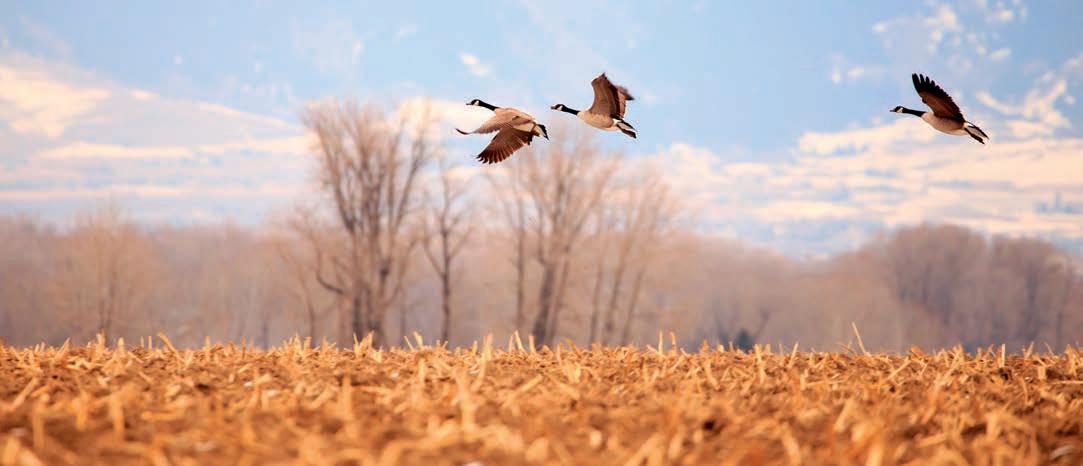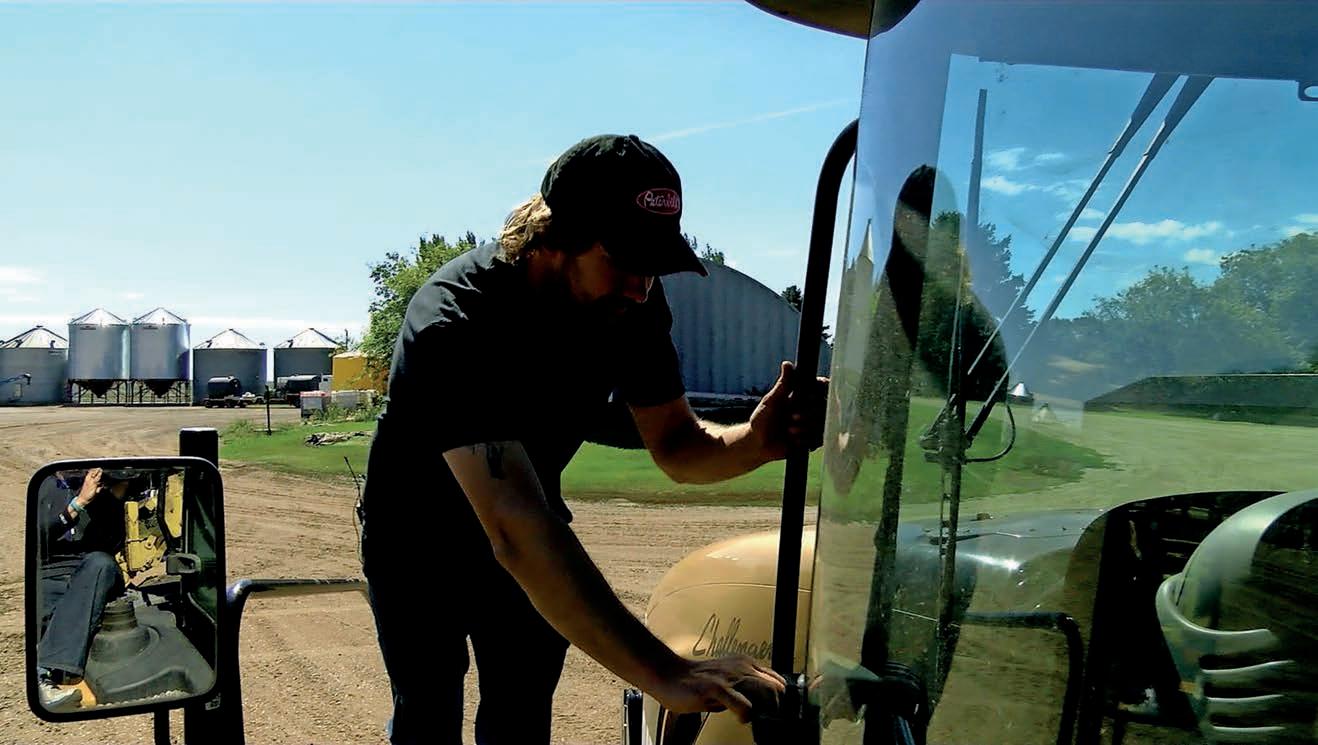
9 minute read
African Nighcrawlers in Brooten
Photos by Carolyn Lange
Mike Larson holds a handful of African Nightcrawlers raised at Brut Worm Farms in Brooten.

Mike and Karen Larson, owners, stand next to the soil bins filled with worms at Brut Worm Farms in Brooten.
BROOTEN WORM FARMER RAISES HERDS OF SOIL-BUILDERS
By Carolyn Lange | clange@wctrib.com
Like any good livestock farmer, Mike Larson does what it takes to make his herd happy with the right food, housing, bedding, temperature and humidity.
As a result, Larson produces a product people can use and – like any good livestock farmer – hopes he can make a living doing it.
But Larson’s herd of 1.7 million is a little unusual.
“I’m a worm farmer,” said Larson.
Specifically, Larson raises African Nightcrawlers.
They are kept in large indoor bins on a bed of locally harvested peat and certified organic grains that the worms consume.
What they produce is tons of worm castings.
“It’s a nice way of saying worm poop,” Larson said.
Rich in natural nutrients and used as a soil amendment, worm castings are especially popular with gardeners in the East Coast and West Coast markets.
“We got into this business because we wanted to try to make a difference for helping people raise more healthy food and grow things more naturally without synthetic fertilizer and the chemicals and growth hormones and things like that,” Larson said.
Continued on page 6
Worm castings are mixed with soil to help plants grow.

Continued from page 5
Chemicals can harm the biology of soil that’s used to raise food, said Larson.
Castings are “chock full of biology” like beneficial microbes and bacteria that’s good for the soil, he said.
Located off Industrial Park Road in the small town of Brooten, Brut Worm Farms has been operating since early 2018.
It wasn’t an easy start.
Learning from mistakes
With broad experience as a software engineer and a long history as an entrepreneur, Larson launched Brut Worm Farms 2½ years ago after he purchased five acres and five buildings where his father once worked building Brut snowmobiles for Brutanza Engineering in the early 1970s. The first-of-its-kind watercooled snowmobile engine was a “big deal” for Brooten before the company was sold and moved, he said.
Working in the buildings where his dad worked is “kind of like coming home for me,” said Larson,

Soil is dumped into a turning trommel to separate the castings as the worms tumble out at the end at Brut Worm Farms in Brooten. who also chose to carry on the “Brut” (pronounced brute) name in his business.
Larson and his wife, Karen, spent three months cleaning the buildings and installing high-efficiency heating and air-handling systems to create an environment with the optimal temperature and humidity.
“They’re like livestock, they create a lot of humidity,” he said. “And they also have a lot of CO2 and you have to keep fresh air circulating in the buildings.”
The first batch of African Nightcrawlers arrived June 2, 2018. There were six bins with about 6,500 worms in each bin.
“We proceeded to lose about 20 percent every two weeks, so we were doing everything wrong,” he said. “That’s probably about the time we thought, ‘what did we get ourselves into?’”
The next thought was that their new business “wasn’t going to last long if we keep going backwards this quick,” he said.
But Larson said they figured out what they were doing wrong, made adjustments to the equipment and pH balance with the bedding and saw the worms multiply and the tonnage of castings grow.
“You learn from your mistakes,” he said. “The trick is to not make them expensive lessons.”
Finding success
They went from six bins of worms to 210 bins in about a year.
Visit our Showroom Today!



AgtoEnergy AgtoEnergy

BiofuelsWorkshop January27th,2021from7:30 -9:00am viaWebinar


1938 82 YEARS 2020
Doug Bernhagen Cabinet/Countertop/Flooring Specialist 320-222-3993
100 NW 10th Street Willmar, MN 56201 | (320) 235-3242 175 Access Drive Spicer, MN 56288 | Phone: (320) 796-2105 www.perkinslumber.net
JameyClinewillbepresentinginformationontheinteractionofthe agricultureand renewablefuelsindustries,including:
• The Statusofthe RenewableFuelsIndustry • TheImpactof RenewableFuelsonAgriculture • RenewableFuelsFundingOpportunities • FundingOpportunitiesforBlenderPumps • UnderstandingtheGovernmentalCommitmenttothe SuccessofAgriculture JameyCline Business DevelopmentDirector Goto www.christiansoncpa.com/workshop toregister ChristiansonPLLP
By the fall of 2020 they had 270 bins.
They sold their first load of worm castings in March of 2019 and within a year they were selling three loads a month.
There are 20 tons of worm castings in each load.
The castings – which are odorfree and look and feel like a rich, crumbly, damp soil – are primarily sold in 2,000-pound “super sacks” to wholesalers in states like California and Pennsylvania.
This summer they began selling 30-pound bags of worm castings on Amazon, which proved to be successful. “It exceeded our expectations,” said Larson. “We sold as much as we could produce, which is a good situation to be in.”
That success came with the added cost of hiring someone to do the online marketing, but Larson said the overwhelming positive consumer reviews gives them hope that they’ll become “one of the top brands” in the worm castings market.
Larson said they hope to add “worm tea” to the list of online items for sale on Amazon. The “tea” is a liquid soil builder produced from the worm castings.
Brut Worm Farms also blends their own garden soil, called “Brut Super Soil” that uses a combination of worm castings, composted chicken manure, peat moss and rice hulls. That soil is currently available at their location in Brooten and through their website, www.brutwormfarms.com.
The worm has turned
Most Minnesotans have some experience with worms, whether it’s worms squirming in a freshly tilled vegetable garden or worms squirming on the end of a fish hook.
The type of worms raised at Brut Worm Farms is not those types of worms.
According to Larson, African Nightcrawlers should be kept at 74 degrees, which is why they are housed indoors.
Unlike nightcrawlers used for fishing and the red wiggler worms that are commonly used for home composting, African Nightcrawlers would die in a refrigerator and would not survive outdoors in a Minnesota winter, he said.
An African Nightcrawler VIDEO lives for about See video 80 weeks. online at wctrib.com During that time they produce a high volume of castings that are sold and tiny cocoons that hold eggs that are nurtured in separate bins to increase the number of worms at the farm.
Making all that happen successfully is a balance of science, a finely tuned environment and big equipment that dumps, tumbles and gently separates globs of tangled worms from the castings and the cocoons in a mesmerizing process that is hard to turn away from.
A computerized system tracks each bin of worms to maintain a schedule that includes dumping out every bin every two weeks on conveyor belts and a trommel that rotates like a cement mixer. The castings drop through a screen at the bottom and the worms tumble out at the end of the trommel.
“They’re nice healthy looking worms,” said Larson as he holds a handful of worms. “We don’t want our babies to get hurt.”
Continued on page 9

Karen Larson fills soil bins with worms at Brut Worm Farms in Brooten.

Brut Worm Farms in Brooten sells worm castings and other soil mixtures. The business operates out of the former building site where Mike Larson’s father once worked building Brut snowmobiles for Brutanza Engineering in the early 1970s. The Larsons retained the Brut name for the farm.


OurCombinedKnowledge&ExperienceisHeretoSupportYou!
Experts areready to assistwith: • LegacyPlanning • Estate Planning • SuccessionPlanning • Tax Planning


• Accounting &Reporting • Bookkeeping&Payroll • FinancialAdvising • BenefitsConsulting &Administration
Creating clients forlife www.christiansoncpa.com |(320)235-5937
Willmar Litchfield Paynesville 302 SW 5th St 194 SLitchfield Ave 212 WJames St #200 Willmar,MN56201 Litchfield,MN55355 Paynesville,MN56362 Call320-235-5937 Call320-373-1040 Call320-235-5937
Mike Larson stands next to a large bag of worm castings at Brut Worm Farms in Brooten. The Larsons recently started marketing their worm castings on Amazon, selling 30-pound bags. They also routinely ship out worm castings with 20 tons of castings in each load.



Mike Larson explains the worm farming process at Brut Worm Farms in Brooten.


Brut Worm Farms in Brooten sells worm castings and pre-mixed soils.
Continued from page 7
After the castings and cocoons are harvested, the worms are put back in a bin full of fresh bedding and stacked on pallets with a forklift.
“She puts them to bed, covers them up, treats them nice and gentle,” said Larson as he watched Karen put the worms in their new bin.
The cocoons are put into smaller bins with different bedding and housed in the nursery building until they hatch and the worms get big enough to begin producing castings, which takes six to eight weeks.
“In every single bin we know exactly what’s going on,” he said.
The schedule isn’t as grueling as dairy farming, “but almost,” said Larson, who now has three fulltime employees.
If the worms aren’t moved to bins full of new bedding they will “suffer” and run out of food, said Larson. An air exchanger provides crucial air circulation that prevents the worms from suffocating, he said.
“They take a lot of maintenance to keep growing healthy and quickly,” he said. “I’m proud of how we’ve been able to figure out how to do that.”
Larson said they’ve learned from their past mistakes and are pleased with the growth of the company. Their next goal is to become profitable.
Carolyn Lange is an agricultural and features writer with the West Central Tribune in Willmar.










